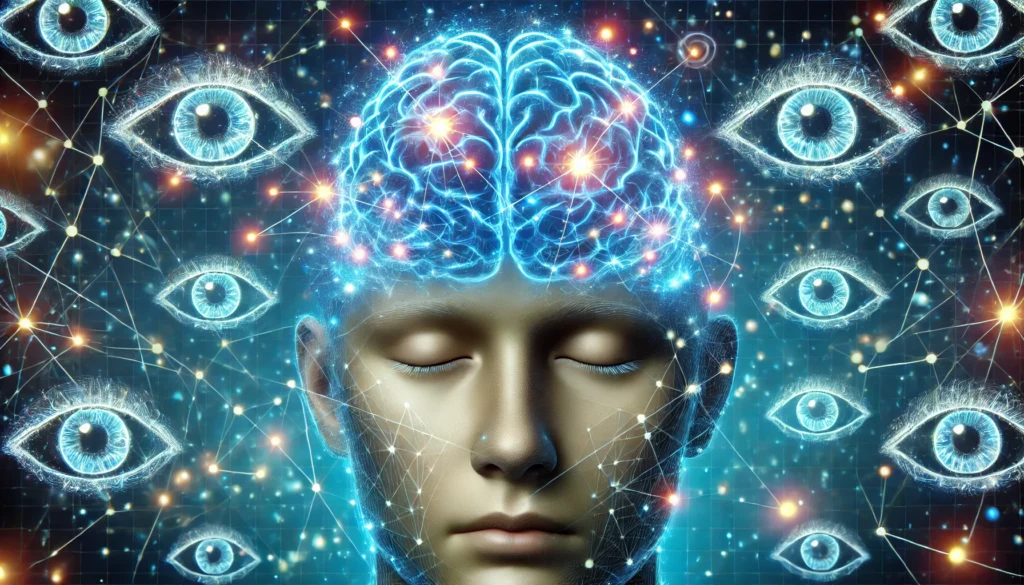To appreciate the importance of preventing awakenings during REM sleep, it’s crucial to first understand its role in the sleep cycle. REM sleep occurs cyclically throughout the night, approximately every 90 minutes, with each phase lasting longer as the night progresses. During REM sleep, your brain consolidates memories, processes emotions, and restores mental acuity, making uninterrupted REM sleep essential for optimal cognitive function.
The Science Behind REM Sleep
Historically, the study of REM sleep began in the 1950s with the pioneering work of sleep researchers Eugene Aserinsky and Nathaniel Kleitman. Their groundbreaking discovery revealed that REM sleep is a distinct physiological state characterized by rapid eye movements, muscle atonia (temporary paralysis), and heightened brain activity. This discovery not only reshaped our understanding of sleep but also opened new avenues for exploring the connection between sleep and mental health.
Current research suggests that REM sleep plays a pivotal role in emotional regulation, creativity, and problem-solving. The intricate processes during REM sleep allow the brain to integrate new information with existing knowledge, fostering creativity and innovative thinking. Moreover, it is during this stage that the brain processes traumatic experiences, potentially offering a natural mechanism for emotional healing. This suggests that adequate REM sleep is not only crucial for day-to-day functioning but also for long-term emotional resilience.
The Role of Neurotransmitters in REM Sleep
Neurotransmitters such as acetylcholine and serotonin have a significant influence on REM sleep. Acetylcholine is known to promote REM sleep, while serotonin and norepinephrine are involved in regulating its duration and intensity. The balance of these neurotransmitters is crucial for maintaining the delicate architecture of REM sleep. Disruptions in their levels can lead to altered sleep patterns and affect overall sleep quality, highlighting the need for maintaining a healthy neurochemical balance for optimal REM sleep.
Impact on Memory and Learning
During REM sleep, the brain undergoes processes that are essential for memory consolidation and learning. Synaptic pruning and strengthening occur, enabling the brain to retain important information while discarding unnecessary data. This process is vital for learning new skills and retaining knowledge. By understanding the intricacies of how REM sleep supports memory and learning, individuals can appreciate the profound impact that uninterrupted REM sleep has on cognitive development and academic performance.
Emotional Processing and Psychological Health
REM sleep is intricately linked to emotional processing and psychological well-being. It acts as a natural mechanism for the brain to process and integrate emotional experiences, reducing the intensity of emotional reactions over time. This stage of sleep is particularly important for individuals experiencing stress, anxiety, or trauma, as it aids in emotional regulation and resilience. The therapeutic potential of REM sleep in managing emotional health underscores the importance of prioritizing sleep hygiene to ensure sufficient REM sleep.
You May Also Like: Sleep Hygiene: Key Practices for Health

Common Causes of Waking During REM Sleep
Understanding the factors that contribute to waking during REM sleep can inform effective strategies for prevention. Some common culprits include:
Stress and Anxiety
Emotional stress and anxiety can disrupt sleep architecture, leading to frequent awakenings during REM sleep. The heightened brain activity during REM makes it particularly susceptible to stress-induced disruptions. Stress hormones, such as cortisol, can interfere with sleep cycles, causing premature awakenings and reducing the restorative benefits of REM sleep. Managing stress through relaxation techniques and lifestyle changes can significantly improve sleep quality and reduce nighttime awakenings.
Sleep Disorders
Conditions such as sleep apnea, restless leg syndrome, and narcolepsy can interfere with the natural progression of the sleep cycle, causing awakenings during REM sleep. Sleep apnea, characterized by interrupted breathing during sleep, leads to fragmented sleep and can severely affect REM sleep continuity. Restless leg syndrome causes uncomfortable sensations in the legs, prompting frequent movements that disrupt sleep. Identifying and treating these disorders is crucial for restoring healthy sleep patterns and ensuring uninterrupted REM sleep.
Environmental Factors
Noise, light, and uncomfortable sleeping conditions can jar you awake during REM sleep. Even subtle disturbances can be enough to interrupt this delicate stage. Ambient noise from traffic, pets, or household activities can disrupt sleep, making the use of soundproofing or white noise machines beneficial. Similarly, exposure to artificial light, particularly blue light from screens, can interfere with the body’s natural sleep-wake cycle, emphasizing the importance of creating a dark, tranquil sleep environment.
Lifestyle Habits
Poor sleep hygiene, irregular sleep schedules, and the consumption of caffeine or alcohol can negatively impact the quality and continuity of REM sleep. Late-night screen time, irregular bedtimes, and excessive caffeine intake are common culprits that disrupt sleep patterns. Alcohol, although initially sedative, can lead to fragmented sleep and reduce REM duration. Establishing healthy sleep habits, such as maintaining a regular sleep schedule and limiting stimulants, is essential for promoting restful sleep and minimizing awakenings.
Impact of Diet and Exercise
Diet and physical activity play a significant role in sleep quality. Consuming heavy or spicy meals close to bedtime can cause discomfort and disrupt sleep, while a sedentary lifestyle can lead to poor sleep quality. Regular exercise promotes better sleep patterns and supports the natural sleep cycle. However, intense physical activity too close to bedtime may have the opposite effect, so timing workouts appropriately is key to optimizing sleep.

Strategies to Prevent Waking During REM Sleep
Armed with an understanding of REM sleep and its disruptors, here are some practical strategies to help you maintain uninterrupted REM sleep:
Optimize Sleep Environment
Creating a sleep-conducive environment is foundational to preventing awakenings during REM sleep. Consider the following:
- Darkness: Use blackout curtains or an eye mask to eliminate light that can disturb sleep. Darkness signals the brain to produce melatonin, a hormone that regulates sleep-wake cycles, promoting deeper and more restorative sleep.
- Sound: Employ white noise machines or earplugs to mask disruptive sounds. Consistent ambient noise can drown out sudden disturbances, helping maintain a stable sleep environment.
- Comfort: Invest in a comfortable mattress and pillows to support restful sleep. The right bedding can alleviate discomfort and pressure points, allowing for uninterrupted sleep throughout the night.
Manage Stress and Anxiety
Incorporating stress-reducing practices into your daily routine can mitigate the impact of stress on your sleep:
- Mindfulness and Meditation: Engage in mindfulness practices to calm the mind and promote relaxation. Techniques such as guided meditation or progressive muscle relaxation can prepare the body for restful sleep by reducing tension and stress.
- Deep Breathing: Practice deep breathing exercises to reduce tension and prepare for sleep. Controlled breathing can lower heart rate and relax the nervous system, creating a tranquil state conducive to sleep.
- Journaling: Write down worries or plans before bed to clear your mind. Journaling can serve as an emotional outlet, helping to offload mental clutter and prevent bedtime ruminations that may disrupt sleep.
Establish a Consistent Sleep Schedule
Regular sleep patterns help to regulate your body’s internal clock, promoting smoother transitions between sleep stages:
- Bedtime Routine: Develop a calming pre-sleep routine to signal your body that it’s time to wind down. Activities such as reading, taking a warm bath, or listening to soothing music can create a peaceful transition into sleep.
- Consistent Sleep/Wake Times: Aim to go to bed and wake up at the same time each day, even on weekends. Consistency reinforces the body’s circadian rhythms, enhancing sleep quality and reducing sleep onset latency.
- Limit Exposure to Screens: Reduce screen time at least an hour before bed to minimize blue light exposure, which can interfere with melatonin production and disrupt sleep onset.
Limit Stimulants and Alcohol
Caffeine and alcohol can interfere with REM sleep, so it’s wise to moderate your intake:
- Caffeine: Avoid caffeine in the afternoon and evening to prevent sleep disruptions. Opt for herbal teas or decaffeinated beverages in the evening to minimize the impact on sleep.
- Alcohol: Limit alcohol consumption, especially close to bedtime, as it can fragment sleep and reduce REM duration. While alcohol may initially induce sleep, it can disrupt sleep architecture, leading to frequent awakenings and reduced sleep quality.
- Monitor Diet: Be mindful of your diet and avoid heavy meals or spicy foods close to bedtime, as they can cause discomfort and disrupt sleep.
Address Underlying Sleep Disorders
If you suspect a sleep disorder is affecting your REM sleep, consult a healthcare professional for evaluation and treatment:
- Sleep Apnea: Treatment options such as CPAP therapy can improve sleep quality for those with sleep apnea. Proper management can alleviate symptoms and enhance sleep continuity, allowing for more restorative REM sleep.
- Restless Leg Syndrome: Medications and lifestyle changes can alleviate symptoms and enhance sleep continuity. Consulting a healthcare provider can help identify appropriate interventions to improve sleep quality.
- Seek Professional Guidance: If sleep issues persist, consider consulting a sleep specialist for a comprehensive assessment and tailored treatment plan to address specific sleep disorders.

Future Implications of REM Sleep Research
The future of REM sleep research holds exciting possibilities for enhancing sleep quality and mitigating sleep-related disorders. Advances in neuroimaging and polysomnography may provide deeper insights into the mechanisms of REM sleep, potentially leading to innovative interventions for sleep disruptions.
Technological Advances in Sleep Research
With the advent of advanced neuroimaging techniques, researchers can now explore the brain’s activity during REM sleep in unprecedented detail. This technology allows for the mapping of neural networks involved in sleep processes, offering insights into how REM sleep supports cognitive functions. As technology continues to evolve, we may uncover new therapeutic targets for enhancing REM sleep and addressing sleep-related conditions.
Genetic and Pharmacological Influences
The exploration of genetic influences on REM sleep could yield new insights into individual variations in sleep patterns and susceptibilities to sleep disorders. Understanding the genetic basis of REM sleep may pave the way for personalized interventions and treatments. Additionally, research into pharmacological agents that modulate REM sleep could lead to novel therapies for conditions such as PTSD and depression, where REM sleep plays a critical role in emotional processing.
Implications for Mental Health and Well-being
REM sleep’s role in emotional regulation and memory processing highlights its potential impact on mental health. Continued research may reveal new strategies for leveraging REM sleep to support psychological well-being and resilience. By uncovering the connections between REM sleep and mental health, we can develop targeted interventions to improve overall quality of life and address specific mental health challenges.
Conclusion
Preventing awakenings during REM sleep is essential for maintaining cognitive function, emotional well-being, and overall health. By understanding the factors that disrupt REM sleep and implementing practical strategies to address them, you can enhance the quality of your sleep and enjoy the myriad benefits of this vital sleep stage. Embrace these changes and embark on a journey toward more restful, restorative nights. Prioritizing sleep hygiene and addressing underlying sleep issues can lead to profound improvements in health and quality of life, underscoring the importance of nurturing your sleep environment and habits.
Further Reading:
Mayo Clinic: REM sleep behavior disorder
SleepScore Labs: Waking Up Between Sleep Cycles & During REM Sleep?
National Library of Medicine: Waking up is the hardest thing I do all day: Sleep inertia and sleep drunkenness
Important Note: The information contained in this article is for general informational purposes only, and should not be construed as health or medical advice, nor is it intended to diagnose, prevent, treat, or cure any disease or health condition. Before embarking on any diet, fitness regimen, or program of nutritional supplementation, it is advisable to consult your healthcare professional in order to determine its safety and probable efficacy in terms of your individual state of health.
Regarding Nutritional Supplements Or Other Non-Prescription Health Products: If any nutritional supplements or other non-prescription health products are mentioned in the foregoing article, any claims or statements made about them have not been evaluated by the U.S. Food and Drug Administration, and such nutritional supplements or other health products are not intended to diagnose, treat, cure, or prevent any disease.


